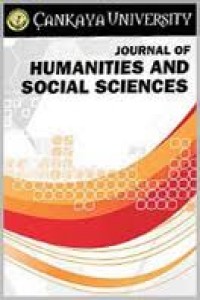Re-Shaping Arab American Cultural Identity in Diaspora in Ward’s “How We Are Bound” and Darraj’s “The New World”
Öz
Anahtar Kelimeler
Arab-American immigrants diaspora assimilation alienation cultural diversity identity crisis
Kaynakça
- Abdelhady, Dalia, “The Sociopolitical History of Arabs in the US: Assimilation, Ethnicity and Global Citizenship.” in Biopsychosocial Perspectives on Arab Americans (New York: Springer US, 2014), pp.17-43. Abinader, Elmaz, “Children of Al-Mahjar: Arab American Literature Spans a Century.” E-Journal of the Department of State, 5/1 (2000), pp.11-14. Web. 21 Mar 2015. Bhabha, Homi K., “Frontlines/Borderposts.” in Angelika Bammer. (ed.), Displacements: Cultural Identities in Question (Indianapolis: Indiana U P, 1994), pp.269-72. ––– ”The Commitment to Theory,” in The Location of Culture (London: Routledge, 2012), pp.28-55. Darraj, Susan Muaddi, “New World,” in Pauline and Mattawa, pp.3-18. El-Aswad, El-Sayed, “Narrating the Self among Arab Americans: A Bridging Discourse between Arab Tradition and American Culture,” DOMES: Digest Of Middle East Studies, 19/2 (2010): pp.234-248. Academic Search Complete. Web. 21 June. 2015. Friedman, Susan Stanford, “Bodies on the Move: A Poetics of Home and Diaspora.” Tulsa Studies in Women’s Literature 23/2 (2004), pp.189-212. Print. Hall, Stuart, and Paul du Gay, Questions of Cultural Identity (London: SADE Publication, 1996). ––– “Conclusion: The Multi-Cultural Question,” in Barnor Hesse (ed.) Un/settled Multiculturalisms: Diasporas, Entanglements, ‘Transruptions’ (New York: Zed Books, 2000), pp.209-38. ––– “Ethnicity: Identity and Differences.” Radical America 23, 4 (1989): pp. 9-20. Web. 20 July 2015 Kaldas, Pauline and Khaled Mattawa, (eds.), Dinarzad’s Children: An Anthology of Contemporary Arab American Fiction (Fayetteville: University of Arkansas Press, 2009). Ludescher, Tanyss, “From Nostalgia to Critique: An Overview of Arab American Literature.” MELUS 31/4 (2006): pp.93-114. Literary Reference Center. Web. 21 Oct. 2015. Orfalea, G., The Arab Americans: A History (New York: Olive Branch Press, 2006). Timotijevic, Lada and Breakwell, Glynis M., “Migration and Threat to Identity.” Journal of Community & Applied Social Psychology 10/5 (2000), pp.355-372. Web. 22 July. 2014. Said, Edward W., Orientalism, (New York: Vintage, 1979). Salaita, Steven, Arab American Literary Fictions, Cultures, and Politics (New York: Palgrave Macmillan, 2007). ––– Modern Arab American Fiction: A Reader’s Guide (Syracuse: Syracuse UP, 2011). Ward, Patricia Sarrafian, “How We are Bound”in Pauline and Mattawa, pp.67-80.
Re-Shaping Arab American Cultural Identity in Diaspora in Ward’s “How We Are Bound” and Darraj’s “The New World”
Öz
Kaynakça
- Abdelhady, Dalia, “The Sociopolitical History of Arabs in the US: Assimilation, Ethnicity and Global Citizenship.” in Biopsychosocial Perspectives on Arab Americans (New York: Springer US, 2014), pp.17-43. Abinader, Elmaz, “Children of Al-Mahjar: Arab American Literature Spans a Century.” E-Journal of the Department of State, 5/1 (2000), pp.11-14. Web. 21 Mar 2015. Bhabha, Homi K., “Frontlines/Borderposts.” in Angelika Bammer. (ed.), Displacements: Cultural Identities in Question (Indianapolis: Indiana U P, 1994), pp.269-72. ––– ”The Commitment to Theory,” in The Location of Culture (London: Routledge, 2012), pp.28-55. Darraj, Susan Muaddi, “New World,” in Pauline and Mattawa, pp.3-18. El-Aswad, El-Sayed, “Narrating the Self among Arab Americans: A Bridging Discourse between Arab Tradition and American Culture,” DOMES: Digest Of Middle East Studies, 19/2 (2010): pp.234-248. Academic Search Complete. Web. 21 June. 2015. Friedman, Susan Stanford, “Bodies on the Move: A Poetics of Home and Diaspora.” Tulsa Studies in Women’s Literature 23/2 (2004), pp.189-212. Print. Hall, Stuart, and Paul du Gay, Questions of Cultural Identity (London: SADE Publication, 1996). ––– “Conclusion: The Multi-Cultural Question,” in Barnor Hesse (ed.) Un/settled Multiculturalisms: Diasporas, Entanglements, ‘Transruptions’ (New York: Zed Books, 2000), pp.209-38. ––– “Ethnicity: Identity and Differences.” Radical America 23, 4 (1989): pp. 9-20. Web. 20 July 2015 Kaldas, Pauline and Khaled Mattawa, (eds.), Dinarzad’s Children: An Anthology of Contemporary Arab American Fiction (Fayetteville: University of Arkansas Press, 2009). Ludescher, Tanyss, “From Nostalgia to Critique: An Overview of Arab American Literature.” MELUS 31/4 (2006): pp.93-114. Literary Reference Center. Web. 21 Oct. 2015. Orfalea, G., The Arab Americans: A History (New York: Olive Branch Press, 2006). Timotijevic, Lada and Breakwell, Glynis M., “Migration and Threat to Identity.” Journal of Community & Applied Social Psychology 10/5 (2000), pp.355-372. Web. 22 July. 2014. Said, Edward W., Orientalism, (New York: Vintage, 1979). Salaita, Steven, Arab American Literary Fictions, Cultures, and Politics (New York: Palgrave Macmillan, 2007). ––– Modern Arab American Fiction: A Reader’s Guide (Syracuse: Syracuse UP, 2011). Ward, Patricia Sarrafian, “How We are Bound”in Pauline and Mattawa, pp.67-80.
Ayrıntılar
| Birincil Dil | İngilizce |
|---|---|
| Bölüm | Makaleler |
| Yazarlar | |
| Yayımlanma Tarihi | 1 Aralık 2014 |
| Yayımlandığı Sayı | Yıl 2014 Cilt: 11 Sayı: 2 |
Çankaya University Journal of Humanities and Social Sciences
General Manager | Genel Yayın Yönetmeni, Öğretmenler Caddesi No.14, 06530, Balgat, Ankara.
Communication | İletişim: e-mail: mkirca@gmail.com | mkirca@cankaya.edu.tr
https://cujhss.cankaya.edu.tr/
CUJHSS, eISSN 3062-0112


